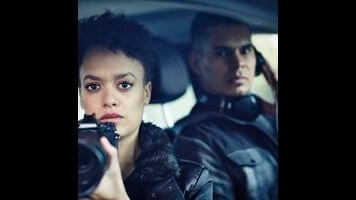Dopey and dour terrorist allegory Hunters misses every target

If your series opens on a scene with a naked woman in a dog cage, you should probably have a much more ambitious agenda than Syfy’s plodding, chuckle-headed alien-invasion drama Hunters. Based on the Alien Hunter novels of Communion author Whitley Strieber and co-produced by genre legend Gale Anne Hurd, Hunters is a dour sci-fi procedural whose every story beat is joylessly copied from more interesting shows (Fringe, The X-Files, a pinch of ’90s sleeper spin-off Alien Nation) and whose pretensions toward political allegory are too simplistic to be truly offensive.
Recreating Washington D.C. in Australia by confining the U.S. capital to abandoned warehouses and nondescript suburban houses, the two episodes supplied to critics establish Hunters’ premise with the mitten-handed nuance of a Wikipedia entry. This is the sort of show where every TV and radio report is prosaically relevant to the people hearing it, and every piece of exposition is repeated twice to make sure the viewer’s got it before moving on. It’s remedial sci-fi.
Nathan Phillips plays protagonist Flynn Carroll, a decorated FBI agent (with a traumatic secret and a mysterious scar) whose loving wife Abby (the woman in the cage, played by Laura Gordon) goes missing one night, leaving him desperate to find her, even as he must care for the troubled teen daughter of his dead partner. He’s recruited into the ultra-secret Exo-Terrorism Unit, which consists of commando types with strange weapons and is led by the blandly avuncular Jackson (Lewis Fitz-Gerald), who informs Flynn, portentously, “The ETU deals with the kind of terrorists other agencies aren’t equipped to handle.” Partnered with badass female agent (with a secret and mysterious arm rash) Regan (Britne Oldford), Flynn is let in on the ETU’s raison d’être: Earth has been infiltrated by aliens called Hunters, who look like us, live among us, even intermarry with us. But the Hunters have a secret agenda only now coming to light through a series of violent attacks, kidnappings, and bombings committed by sleeper agents and their human collaborators.
Yup, it’s a terrorism allegory painted in crude brushstrokes of thuddingly obvious dialogue and goopy alien guts. The ETU coroners are perpetually busy dissecting dead Hunters and yanking out slimy alien organs, while informing us that, though they look like humans on the outside, they’re hiding a super-tough interior, “possibly the result of evolution in a stronger-gravity environment.” Lest the terrorism parallels sail over anyone’s head, the empty-warehouse-looking ETU headquarters regularly rings with explanatory lines like, “What we do know is that Hunters make ISIS look like Girl Scouts,” and “He’s like the Bin Laden of little green men.”
That last remark refers to villain McCarthy (Julian McMahon), who—in addition to being the one keeping Abby in that dog cage—is the mastermind setting the Hunters’ terrorist plans in motion. Activating the various alien “cells” and doing creepy, ickily invasive medical tests on the captive Abby and himself, McMahon also sends out secret alien messages in the form of hidden code embedded in a recording of O.M.D.’s “Maid Of Orleans,” which gets played even more than you’d imagine. McMahon’s going for “arch, sexy, and dangerous” here, but, thanks to Hunters’ uniformly tinny dialogue, his scene-devouring hamminess is showy without being especially entertaining. He rasps, grimaces, struts, and says would-be menacing things like “Wanna hear my magic, Abby?” alongside a constant chorus of generic, insect-like alien chittering noises that are meant to be chilling but quickly become irritating with overuse.
The rest of the cast—mostly Aussies, as is McMahon—aren’t even that lucky. Phillips and Oldford’s strategy for playing American involves stone-faced super-seriousness, bereft of identifiable personality. Phillips makes for an especially dull lead, his charisma-free performance turning every emotional beat into the same growly, clench-jawed threats and too-obvious questions. Mark Coles Smith as handsome ETU squaddie Briggs has to contend with dialogue like, “Time to nut up, cornflake,” and “We’ve got our dicks flapping in the wind up here.”
There’s always the possibility that Hunters (and the Hunters) will turn out to be somehow more interesting in later episodes. But a show plays some essential cards in its initial outings, and these look very unpromising indeed. The action is sluggish and perfunctory, with most encounters playing out as shadowy warehouse chases where tension is equated with lack of situational awareness by the heroes. The Hunters themselves are a nondescript jumble of alien races we’ve seen many times before—they’re strong, fast, can skitter through trees with all the agility a poor man’s wire team can muster, and keep rabbits for some reason. (“They like rabbits—to hunt. They can’t help themselves,” explains Regan). The show doesn’t do anything inventive with their vulnerability to certain sounds—those ETU guns fire sonic blasts that can pulp a Hunter if you hit it right—and, while the show’s commitment to practical-effect grossness might be a plus for some, Hunters never reaches any true Fringe-level body horror. And as for the political subtext, while the reason for the Hunters’ assault on this unconvincing version of America will no doubt be revealed more fully, their statements like, “We’re in your houses, your churches, and you don’t even know it. We’re everywhere and you can’t stop us!” reveal nothing but the lowest-rent, fear-mongering text of a sci-fi series without a single original idea.